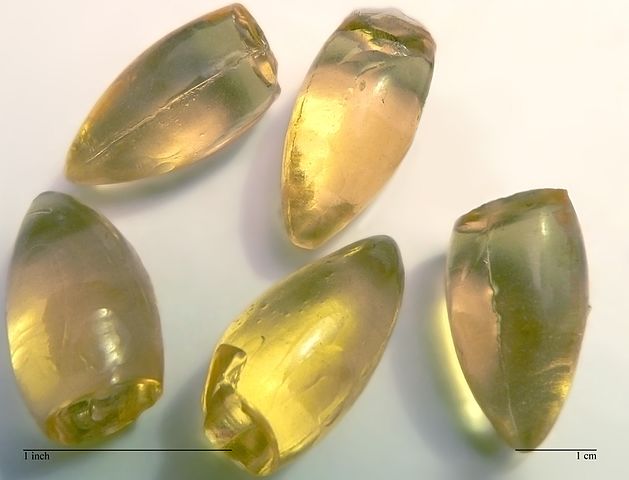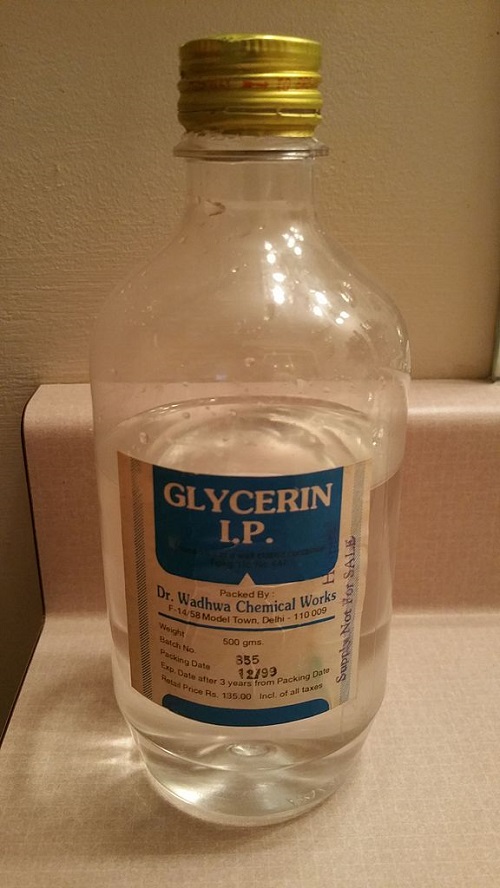Difference Between Glycerol and Glycerin

Glycerol laxatives
Glycerol vs. Glycerin
Glycerol and glycerin – is there really a difference between the two? More and more people are using these two different words as one, but are they really wrong?
There may not be a big difference distinguishing the two concepts, but there is a clear line between them. They may seem interchangeable, but anyone familiar with the topic knows there is a distinction between glycerol and glycerin. It is common knowledge that they are the same thing, and some think that the term “glycerin” is the word used by common people, while experts in the chemistry field call it “glycerol”.
Glycerin is needed to produce glycerol. It is a commercial compound and is the key element of creating glycerol. Because of their relationship, glycerol and glycerin are used almost in very similar ways.
Glycerin was discovered by Carl Sheele in 1779. It is a polyol compound used for various purposes, for example as a food sweetener or a preservative. The consistency of glycerin is thick, but it becomes a gummy-like substance when frozen. Glycerin is both a humectant (it helps draw moisture onto the skin, which is why it is used for body lotions), and an emollient (it helps maintain the stability of moisture levels).
Glycerol is a component of fats and is a colorless compound. It is usually used in the winemaking process; it adds a sweet taste to the wine. It is an ideal alternative for sugar due to the fact that it only contains about 27 calories per teaspoon. Aside from being a natural sweetener, glycerol also acts as a thickening agent, a solvent, and a preservative. It is a result of the fabrication of soap, biodiesel fuels, and refined vegetable oil. Because it is low in toxicity, glycerol is widely used by different manufacturers.

Bottle of Glycerin
Glycerol and glycerin are usually found in day-to-day products such as food, medicines, and cosmetics.
Other key differences between glycerol and glycerin are the products they are used in. For example, glycerin is responsible for the texture of ice cream while also helping minimize the amount of sugar used. Glycerol is the component used to shape the form of medicines, such as cough syrups (their thickness) and body creams. Glycerin is also used to produce toothpaste that helps maintain the shininess of the teeth. As for medical purposes, glycerol helps in decreasing the brain swelling in people, especially in cases of brain hemorrhage. Additionally, a glycerol suppository is very helpful in curing constipation.
The American Dietetic Association puts glycerol in the carbohydrate group when used in food manufacturing. Glycerin, on the other hand, is more likely to be categorized under sugar due to its density.
Although they have their differences, glycerin and glycerol are both defined as the connecting chemical in fats in regard to their chemical structure. With all this information in mind, it is now easier to distinguish between the two compounds.
Summary:
1.Glycerol and glycerin are usually found in day-to-day products such as food, medicines, and cosmetics.
2.Glycerin is needed to produce glycerol.
3.Because of their relationship, glycerol and glycerin are used in very similar ways.
4.Glycerin is both a humectant and an emollient.
5.Glycerol is a component of fats and is a colorless compound.
6.Glycerol is an ideal sugar substitute because it only contains around 27 calories per teaspoon.
7.Because it is low in toxicity, glycerol is widely used by different manufacturers.
8.Other key differences between glycerol and glycerin are the products they are used in.
- Differences Between Fraternity And Sorority - January 8, 2014
- Differences Between Lucite and Plastic - January 7, 2014
- Differences Between Oil and Butter - January 6, 2014
Search DifferenceBetween.net :
16 Comments
Leave a Response
References :
[0]https://en.wikipedia.org/wiki/Glycerol

Glycerin and glycerol are chemically the same. They have the same chemical formula (CH2OH-CHOH-CH2OH). Glycerin is the common name of glycerol. The generic (proper name) is 1,2,3-trihydroxypropane.
which is better for a higher heat reaction with potassium permanganate?
I wonder if one could use them both to mix with flavored oils to vape?I know that one can use the vegetable glycerine.
Glycerol can indeed be used as an eliquid for Vaping (E-cigs). The small electronic cigarette that RJ Reynolds has now produced has the word Glycerol i’m its ingredients (not Glycerin). I do have to say, I am still confused as to their different uses. If they Are the same thing, which this article Starts Out saying. Then why are they used for different things? At least at times. Joel.
Thank you very much for your differentiation between glycerol and glycerin. I have a dermatological condition on my lips called exfoliative cheilitis. It is a scaly lip condition. There is a medical journal article called
As per this review article (from the Glycerine Producers’ Association, authored in 1963, cited by 13 papers as per Google Scholar):
http://www.aciscience.org/docs/physical_properties_of_glycerine_and_its_solutions.pdf
From the introduction:
“Glycerine (sometimes glycerin) is the term most often applied to the commercial product, which usually contains a small percentage of water. Glycerol (chemically, also 1,2,3-propanetriol) refers to the chemical compound and content in a formulation, specifically to the trihydric alcohol C3H5(OH)3.”
So, this would be a good replacement for this entire article!
I am a chemist and I don’t see the distinction this article is trying to make.
From a chemist point of view, a glycerin is a type of molecule. For example Nitroglycerin is the nitrated form of glycerol.
Glycerol to a chemist means “glycer” denotes that it is a glycerin, and “-ol” means that it is an alcohol.
Glycerol is a glycerin with 3 alcoholic groups on it.
When someone says “glycerin” and theyre not being specific as to what glycerin theyre talking about, it is understood to mean glycerol because that is the parent compound of all its derivatives.
I could understand if industry made a distinction between pre processed glycerin (containing many glycerins) and post processed glycerol (containing specifically glycerol), but the real world difference is arbitrary.
In short, I believe the distinction this article is drawing is just wrong.
Hello Garrett:
Thank you for clarifying, Mr. Scientist.
No! Garrett is incorrect… Glycerin is the parent of Glycerol.
Vegetable glycerin, propylene glycol, methylene glycol, ethylene glycol, glycerin of borax are same as “dihydroxypropane triol”
If you put sucrose (table sugar) onto that above solution (means thickening), and you will get glycerin aka glycerol “trihydroxypropane triol” and glycerin fluid is same like silicone fluid
They wont make you smart brother & sister, they just wanna make you confuse.. ^_*
Thanks a lot for clarifying the doubts.
There is zero difference between them. Glycerol, glycerine and glycerin are different names for the same thing.
Source: me and many years in the glycerine industry.
How can I produce Glycerol using low cost?
Thnx
Glycerin production how.pl tell me
The “glycerin” found in hand sanitizers tends to leave little or no residue. A bottle of “glycerin” mixed with alcohol, bought online leaves a greasiness on my hands. My mixture was very similar to any sanitizer. Is one of these possibly glycerol ?
There is no difference at all, just different names for the same chemical.
Glycerol
Glycerin
Glycerine
Propanetriol
1,2,3-Trihydroxypropane
1,2,3-Propanetriol
The correct IUPAC name for the chemical is 1,2,3-Propanetriol but the common trivial names that people use are glycerol and glycerin.